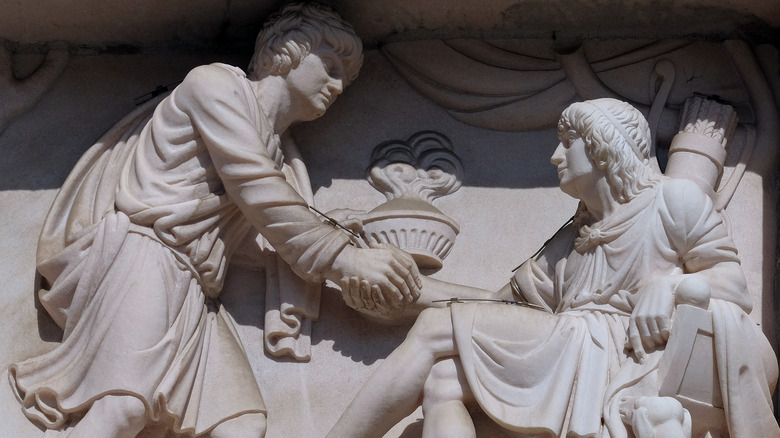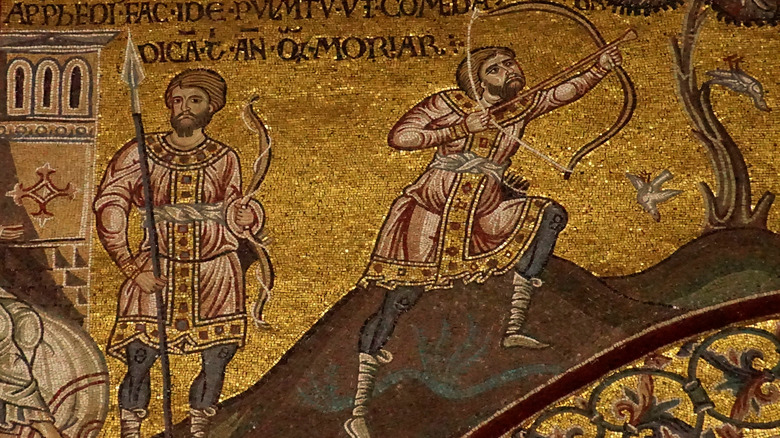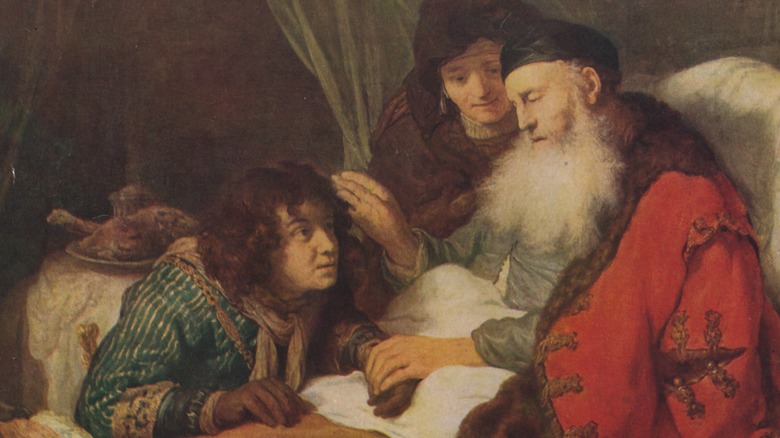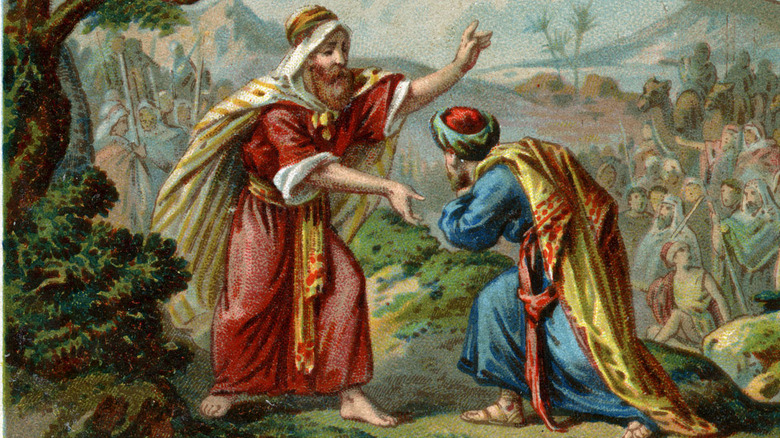The Truth About Jacob And Esau's Feud In The Bible
If you think your family is dysfunctional, wait till you hear the Biblical story of Jacob and Esau. It's a sibling rivalry tale like no other. The story is told in several chapters and verses of Genesis (via Britannica). It begins with twin brothers who were doomed since they were in the womb. When their mother Rebekah was pregnant with them she felt a slight discomfort. Little did she know that this was a sign of an impending issue that would set the course of Jacob and Esau's relationship. Her twins were rivals as fetuses. In seeking answers about her pregnancy concern, she turned to her faith and learned that she was having twins (My Jewish Learning). But she also learns that despite them being born together, they wouldn't have equal standings in the world. This decision is probably why Rebekah would favor one over the other in later life.
On the day the twin brothers were born, Esau entered the world first and was followed by Jacob, who was holding on to his brother's leg. Esau was red-haired and hairy, and Jacob was not. They were fraternal twins and had very different physical characteristics (and personalities). Long ago, the rules were that the first-born son earned the entitlement to the father's birthright — a role that carried responsibility as the man of the house. So while they were twins, it meant that it would go to whomever came first. In their case, it was Esau.
A growing rivalry
Their father Isaac already determined that Esau would have the birthright. He was also Isaacs's favorite son, whereas Jacob was Rebekah's favorite. Each parent favored a child and each child was different. Esau was an outdoorsy huntsman, and Jacob was a shepherd (both depicted above) who often tended to the home (via Theology of Work). Jacob and Esau both knew of their standings in their father's eyes, particularly Jacob who was out of luck regardless. Because this meant that in their father's passing, he'd have to follow the orders of his twin brother Esau. But Jacob's understanding of this fact is also what made him much more highly aware, much to the forthcoming detriment of Esau.
One day after a hunt, Esau was starving and hungry. Arriving home he saw a meal that Jacob prepared and desperately wanted to indulge. Knowing of his lifelong disadvantage for the birthright, Jacob thought of a scheming idea (via Bible Study Tools). He said he would give Esau something to eat, but under the condition that he'd promise him his birthright. Crippled with hunger, Esau had to think quickly. Eat now and give up my birthright? Or refuse to give my birthright, and starve? In that moment, the birthright served no value to his hunger, and Esau thought of nothing to easily give it up. Which he did. However, the rash decision would come back to bite him.
A blessing by deception
Their father Isaac was nearly blind, and had very bad vision (Bible Study Tools). While on his deathbed, he reminded his oldest and favorite son to fetch him a meal and then he'd give his blessings for the birthright. Esau left to go hunt as he always did. Unbeknownst to him however, his own mother overheard Isaacs's request and immediately schemed up a plan to have Jacob act as Esau to receive their father's blessing. He was her favorite child after all.
In their effort, Jacob had to be convincing and their plan was to have him impersonate Esau to get the blessing. Because Isaac showed favoritism towards Esau, this also signified that he knew basic characteristics of his son despite being unable to see. One particular trait: Esau's hairiness — something Jacob lacked. So Jacob brought him a meal and used sheepskin to deceive his father into thinking that he was Esau. The scheme worked and Jacob earned their father's blessing.
A broken brotherhood
When Esau returned he was enraged to discover what Jacob had done and wanted to kill him. As a result, Jacob had to flee to escape the wrath of his brother.
In this family, this particular blessing meant something more than just a "blessing." Their grandfather Abraham was promised by God to have his blessings for himself, his family, and his descendants. This is called the Abrahamic covenant (via Christianity). Not only did Isaac passing it onto Esau meant that he, too, would have the major blessings in life, it also meant that he was passing on something that would have a major effect on the world. Only he didn't get that, and Jacob was the recipient instead. It would take two decades (Britannica) before the brothers reunited again (depicted above), and when they did, the long-feuding brothers would finally reconcile. Esau forgave Jacob for deceiving him into giving his birthright, and taking the blessing that he knew wasn't meant for him (via The Torah). Today their story is often told to teach about deception and forgiveness.



